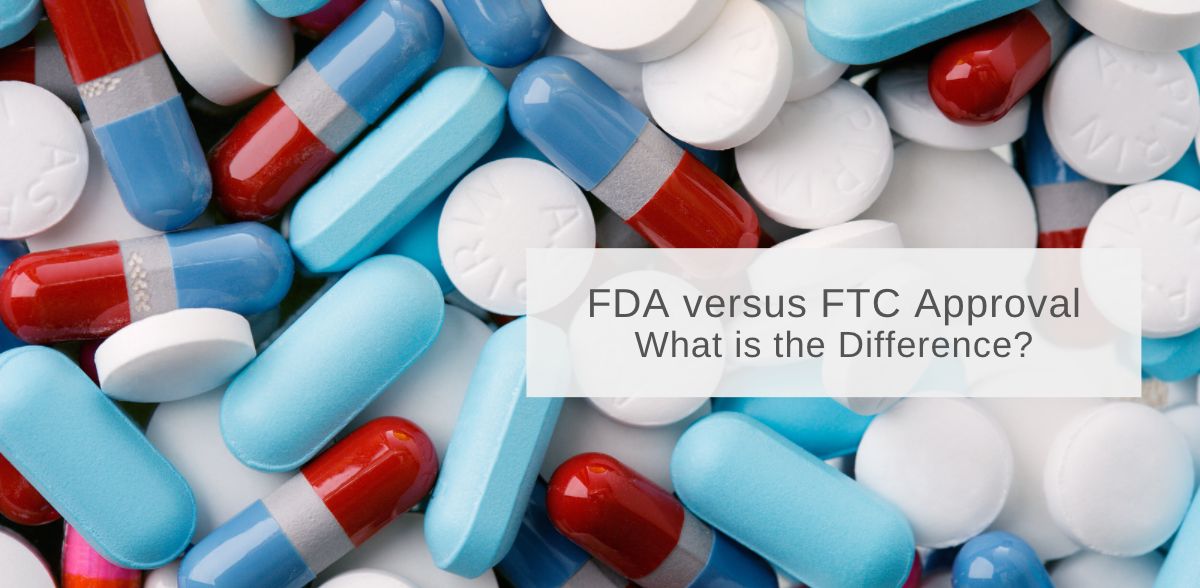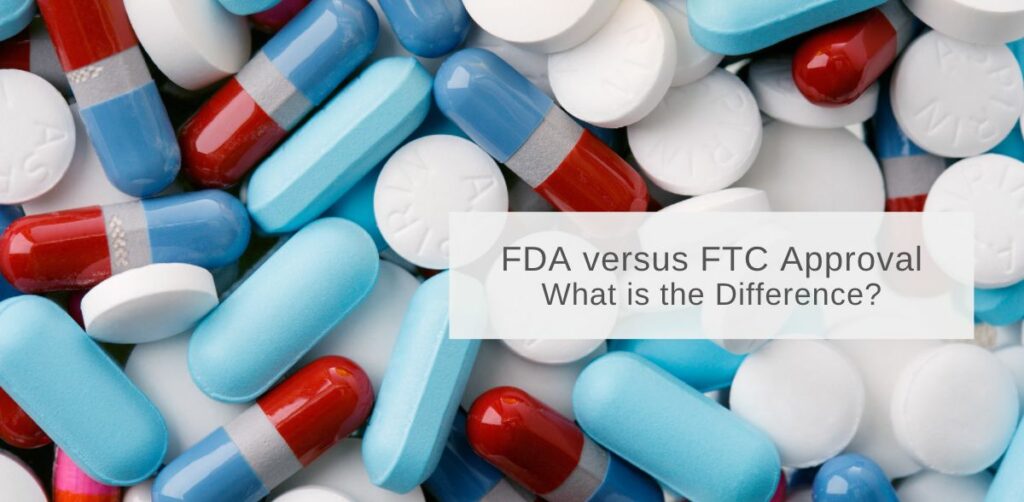
Summary
The difference between nutraceuticals and pharmaceuticals is poorly understood by the general public and, as a result, people are often alarmed when seeing a label informing them that, “this product is not FDA approved.” While this message may be alarming to consumers, it does not mean that products displaying this message are unregulated. Unlike pharmaceuticals, which need FDA approval, nutraceutical products are approved for market by the Federal Trade Commission (FTC).
In this article we aim to clarify the intent behind these therapies and what their labelling means by asking: Why aren’t nutraceutical products FDA approved? How do FDA and FTC approvals compare? And – how should you market your product? What legal issues do both tracks pose?
Why aren’t nutraceutical products FDA approved? And How do FDA and FTC approvals compare?
In differentiating between nutraceutical and pharmaceutical products, the industries’ rule of thumb is that nutraceuticals are used for nutritional purposes, to promote wellness or longevity, while pharmaceuticals are used medicinally, to treat disease. In a broad sense the Food and Drug Administration (FDA) oversees both pharmaceuticals and nutraceuticals, however, while new drugs have to receive FDA approval by proving their safety and efficacy before going to market, manufacturers of nutraceuticals themselves are responsible for ensuring their products’ safety. This difference is due to the Dietary Supplement Health and Education Act (DSHEA), which distinguished dietary supplements (which nutraceuticals are a subset of) from “conventional” food products, while specifying that they are not intended for medical use. Thus, supplements were placed outside of the direct purview of the FDA.
It is important to note, however, that there is an exception for supplements that contain new dietary ingredients (“new” meaning that they weren’t on the market pre-October 1994), making them subject to more regulation. But this is not something to worry about if your supplement sticks to using popular ingredients such as calcium, whey protein, vitamin-D (Tricario, 2021).
The bottom-line:
Nutraceuticals are used for nutritional purposes, to promote wellness or longevity, while pharmaceuticals are used medicinally, to treat disease. Since supplements are not intended for medical use they were placed outside of the direct purview of the FDA.
While nutraceuticals’ regulatory body is the FTC, which ensures supplements are advertised properly, nutraceuticals must also abide by the good manufacturing practices (GMP) put forth by the FDA. These are guidelines for safe and controlled production of products. However, unlike an FDA-approved product, nutraceutical manufacturers are responsible for ensuring their products meet these guidelines – the FDA will audit if a claim is filed.
How should you market your product?
Under DSHEA, dietary supplements, including nutraceuticals, are required to include a disclaimer stating that the product is not intended to “diagnose, treat, cure or prevent any disease,” because only a drug (pharmaceutical) can make such a claim. Beyond this disclaimer, supplements and nutraceutical products can only make structure/function claims, which are claims that describe how a nutrient impacts the structure/function of the body. Claims are regulated by the Federal Trade Commission (FTC), which is responsible for overseeing advertising; and this is where confusion between nutraceuticals and pharmaceuticals can occur because the difference in marketing comes down to very specific verbiage. For instance, a nutraceutical product can state that it, “helps maintain” or “promotes healthy bones”, but it cannot state that it “mitigates” or “prevents osteoporosis” (https://ods.od.nih.gov/factsheets/DietarySupplements-Consumer/). It is vital to understand these nuances when preparing to bring a product to market, otherwise, the FTC and FDA may take legal action against you.
The bottom-line:
If your product is a vitamin, a mineral, an herb or other botanical, an amino acid, or a dietary substance that has not undergone clinical trials and the FDA’s approval process, then your product is considered a dietary supplement by the US government and should be marketed as such. This means your product must include a statement saying it is not disease curing or preventing, and your marketing verbiage must revolve around health benefits.
“An Ounce of Prevention Is Worth A Pound of Cure.”
Ben Franklin coined this phrase in 1736, as a warning to Philadelphians to remain vigilant about fire awareness and prevention, but this phrase has been applied to a wide range of topics, including nutraceutical products. The analogy is a good one, and one that consumers are obviously buying into given the recent dietary market report. This report stated that the global dietary supplements market is currently valued at $278.8 billion USD, and is expected to grow to $441.7 billion USD by 2026 – a growth rate of 7.8% (ReporterLinker, 2021).

What legal issues do both tracks pose?
Given the growth of the dietary supplements industry, it isn’t surprising that more people are paying attention to it – and many of them want stricter regulations. The demand for stricter regulations is not new, but the controversy has gained more traction in recent years, with the FDA and FTC issuing multiple ‘crackdowns’ in 2021, such as their suits against six CBD companies for false claims, and five companies for selling misbranded infertility supplements. Proponents of increased oversight point to the strong effects that supplements can have on the body. For instance, it is known that excess vitamin A can cause headaches and liver damage, while too much iron can cause nausea and vomiting, along with liver damage (NIH, 2020). This can be particularly risky if someone is taking a high dose of the supplement or taking prescription medications. Not only can supplements have adverse effects when combined with prescription medications, they often can make the drugs less effective. For example: St. John’s wort can increase how fast your body metabolizes medicines such as antidepressants, birth control pills, heart medications, and transplant drugs, Vitamin K can inhibit the blood thinner drug Warfarin, and antioxidants like vitamin C and E can impede chemotherapy (NIH, 2020). Another argument for stronger regulations is merely to ensure supplements actually contain the ingredients they claim to, at the dose they claim to, before these products are brought to market rather than relying on consumers to file a claim if there is an issue.
This being said, the FDA’s approval process to bring a new pharmaceutical to market and earn the “FDA-approved” label can cost hundreds of millions (if not billions) of dollars, and with dietary supplements experiencing such a profitable market right now, the concept of increasing regulations is not popular inside the nutraceutical industry.
The bottom-line:
In 2019 the FDA Commissioner, Scott Gottlieb, announced that the nutraceutical and dietary supplements industry will face stricter scrutiny from the FDA. This means bringing more suits against manufacturers which could result in fines, or court-ordered removal of products from retailers. Recently, more consumer class action lawsuits have been filed against supplement companies, leading lawyers to recommend companies go beyond regulatory compliance to ensure their products are marketed in a way that “a reasonable consumer” wouldn’t find fault with. Claims can be brought for false or misleading structure/function claims, ingredient permissibility, flavor and coloring claims, and nutrient content claims.
So, what is the way forward?
It is challenging to talk about nutraceuticals because the term isn’t recognized by the FDA, even in this article you can tell that the discussion has gone from nutraceutical products to the umbrella term ‘dietary supplements.’ But this is not the case everywhere. For instance, in Europe, the European Food Safety Authority (EFSA) includes ‘nutraceutical’ in their guidelines, and outlined regulations specifically to regulate these products’ safety (Helal et al., 2019). This grey area between what constitutes a nutraceutical and the regulations for it, can be seen throughout the global market. So first, it would be beneficial to universally adopt a clear definition of ‘nutraceuticals.’ Then, there is the issue that most nutraceuticals lack data, or they do not have a way to affordably test their safety and efficacy. Rather than requiring nutraceutical manufacturers to go through the rigorous process used to screen pharmaceutical drugs, or leave screening almost entirely up to consumers, there should be a third way. A lower cost, less rigorous screening method should be developed for nutraceuticals, as this would protect the consumer, while bolstering the nutraceutical industry.
Glossary
- FDA (Food and Drug Administration) : responsible for taking action against any adulterated or misbranded dietary supplement product after it reaches the market.
- FTC (Federal Trade Commision) : regulates advertising, including infomercials, for dietary supplements and most other products sold to consumers. FDA works closely with FTC in this area, but FTC’s work is directed by different laws.
- GMP (Good Manufacturing Practices): regulations set forth by the FDA to ensure products are consistently produced and controlled according to quality standards.
- Nutraceuticals : a foodstuff (such as a fortified food or dietary supplement) that provides health benefits in addition to its basic nutritional value” (Merriam-Webster, n.d.). Notably, the term originated from ‘nutrition’ and ‘pharmaceutical.’ In the industry, the term ‘Nutraceutical’ is often used rather than ‘dietary supplement’, as a way of specifying that the product is related to health span or lifespan. However, the FDA does not use the term ‘nutraceutical’ in their guidelines, instead, they are food additives that are GRAS (Generally Recognized as Safe). And, is considered to fall under the category of ‘supplements.’
- Safety and concordance with FDA and FTC guidelines for labelling and marketing is the responsibility of manufacturers, consumers can file reports against supplement products.
- Examples: herbs and teas such as ginseng, green tea, echinacea, turmeric and garlic. Supplements such as vitamin D, B12, omega-3, folic acid, and minerals like calcium and iron. Other common ones include: fish oils, caffeine and probiotics.
- Pharmaceuticals / Drugs : A substance intended for use in the diagnosis, cure, mitigation, treatment, or prevention of disease, or more broadly: a substance (other than food) intended to affect the structure or any function of the body
- Must go through a rigorous application process that includes clinical trials to show drug safety (unless using one of the FDA’s expedited pathways)
- Examples: pain relievers such as Tylenol, and Advil. Allergy relief pills like Benadryl, and Zyrtec. As well as, anti-seizure meds, birth control pills, antidepressants, and heart medications.
- Dietary Supplement (As defined by DSHEA): “a product (other than tobacco) that is intended to supplement the diet that bears or contains one or more of the following dietary ingredients: A vitamin, a mineral, an herb or other botanical, an amino acid, a dietary substance for use by man to supplement the diet by increasing the total daily intake, or a concentrate, metabolite, constituent, extract, or combinations of these ingredients.”
- DSHEA (Dietary Supplement Health and Education Act): Signed in 1994, this law amended the Federal Food, Drug, and Cosmetic Act; it defined ‘dietary supplement’ and created a new regulatory framework for the safety and labelling of these supplements. Previously dietary supplements were regulated as food products, but under DSHEA the manufacturers and distributors of supplements must evaluate their own products for safety, and accurate labeling/marketing. There is an exception to FDA regulations for dietary supplements if the supplement contains a ‘new dietary ingredient’ – a new ingredient notification must be submitted to the FDA which states that the manufacturer has concluded the ingredient will “reasonably be expected to be safe under the conditions of use recommended or suggested in the labeling.”
- Dietary Ingredient: a vitamin, mineral, herb/botanical, amino acid, a concentrate, metabolite, constituent, extract or dietary substance for use by man to supplement the diet by increasing the total dietary intake (e.g., enzymes or tissues from organs or glands).
- New Dietary Ingredient: a dietary supplement that was not sold in the U.S. as a dietary supplement before October 15th, 1994.
Ready to revolutionize healthcare through drug discovery? Contact us now and leverage our comprehensive drug discovery services to accelerate the development of transformative therapies.
References
- FDA (2019). Questions and Answers on Dietary Supplements https://www.fda.gov/food/information-consumers-using-dietary-supplements/questions-and-answers-dietary-supplements
- Helal, N. A., Eassa, H. A., Amer, A. M., Eltokhy, M. A., Edafiogho, I., & Nounou, M. I. (2019). Nutraceuticals’ Novel Formulations: The Good, the Bad, the Unknown and Patents Involved. Recent patents on drug delivery & formulation, 13(2), 105-156. https://doi.org/10.2174/1872211313666190503112040
- Merriam-Webster. (n.d.). Nutraceutical. In Merriam-Webster.com dictionary. Retrieved August 24, 2021, from https://www.merriam-webster.com/dictionary/nutraceutical
- Mile Rock (2019). How the FDA Regulates Nutraceuticals, FDA Reader, a free food industry resource developed by Mile Rock. https://www.fdareader.com/blog/how-the-fda-regulates-nutraceuticals
- NIH, Office of Dietary Supplements (2020). What You Need to Know. https://ods.od.nih.gov/factsheets/WYNTK-Consumer/
- ReporterLinker (2021). Global Nutraceuticals Market to Reach $441.7 Billion by 2026, Global Newswire. https://www.globenewswire.com/
news-release/2021/10/14/ 2314154/0/en/Global- Nutraceuticals-Market-to- Reach-441-7-Billion-by-2026. html - Santini, A. & Novellino, E. (2018) Nutraceuticals – shedding light on the grey area between pharmaceuticals and food, Expert Review of Clinical Pharmacology, 11:6, 545-547, DOI: 10.1080/17512433.2018.1464911
- Tricarico, Vincent (2021). The Legal Aspects of Starting a Supplement Company. NutraScience. https://www.nutrasciencelabs.com/blog/legal-aspects-of-starting-a-supplement-company



